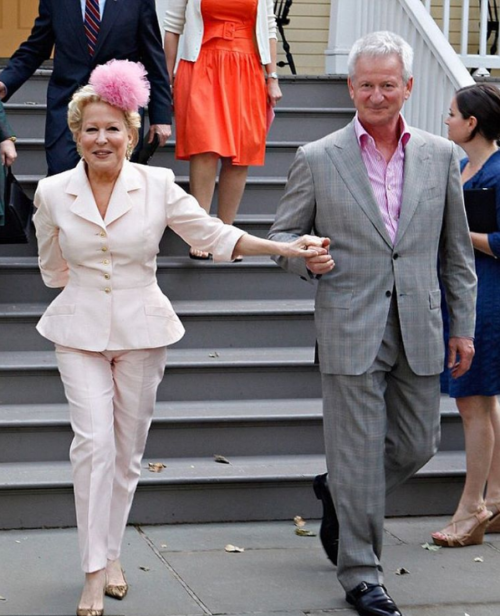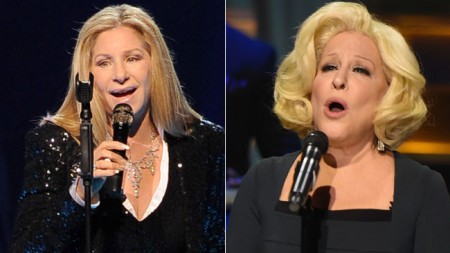The Washington Post
A divine showing of divas put the ‘broad’ in Broadway
By Karen Heller April 6 at 2:03 PM
NEW YORK — In the beginning, there was Ethel.
Merman, the legend who required no introduction or microphone.
Ethel begot icons such as Mary Martin, Liza Minnelli and Barbra Streisand, divas known to their loyal subjects by first names only, as though they were dear friends.
In musical theater, there is nothing like a dame, a star of great voice, astonishing presence and dazzling wattage. A diva’s acting chops match her vocal power. She masticates the scenery. She leaves a mark. She sports her pain like pearls. Hurt and indomitability define her, conveyed in a multi-octave, act-concluding anthem that tears down the house and obliterates all memory of everyone else on stage.
Singer Ethel Merman is seen in a 1934 publicity photo taken while starring on Broadway in the musical, “Anything Goes.” (Associated Press)
This spring, the theater is alive with the sound of divas — Bette Midler, Patti LuPone and Glenn Close — larger-than-life performers who are putting the broad back in Broadway. Like a vintage wine, it can take years to become a diva. All three actresses are in their 60s or 70s.
Midler helms the latest revival of “Hello, Dolly” — take her wraps, fellas — in previews and scheduled to open April 20. Her name, in second-coming type, envelops the Shubert Theatre.
“Hello, Dolly” is a vehicle for outsize performers — Carol Channing, Pearl Bailey, Barbra on screen — who mow down everyone in their path. One of the show’s original proposed titles was “Dolly: A Damned Exasperating Woman,” a line retained in the script, to which Dolly responds, “Why, Horace Vandergelder, that is the nicest thing you have ever said to me.”
The show is all about Dolly. No diva, no Dolly. For producer Scott Rudin, betting on Bette proved a shrewd move: Advance ticket sales total more than $40 million, a $9 million jackpot occurring on the first day.
Midler is teeny. On a good day, she claims 5-foot-1, Polly Pocket with a cathedral organ set of pipes. But Midler knows how to cast a shadow, make an entrance, rock an outfit (a mermaid’s tail, a crimson halo of ostrich feathers), own the stage and seize an evening.
Beginning with her gay bathhouse appearances in early 1970s Manhattan, Midler became a brand that encourages worship and attracts faithful acolytes. She not only mined a title — the Divine Miss M — but also mastered a signature geisha-like walk of tiny, mincing steps. She owns that move.
Singer Liza Minnelli takes her curtain call at the opening night of “Liza’s At The Palace?!” on Broadway. (Andrew H. Walker/Getty Images)
Ownership is essential to a diva: a manner of speech, a gesture, a role. Divas never lease. Sometimes, divas tear down the house, as Streisand did in “Funny Girl” and LuPone did in “Evita,” making it nigh onto impossible for other actors to claim the role.
In “Hello, Dolly,” Midler plays the meddling, indomitable Dolly Gallagher Levi, a character who doesn’t interpret songs so much as hurl them to the balcony’s back row.
LuPone and co-star Christine Ebersole, a quartet of Tonys between their manicured paws, portray battling cosmetic titans Madame Helena Rubinstein and Miss Elizabeth Arden in “War Paint.” As Ryan Murphy’s FX drama “Feud: Bette and Joan” makes clear, the only thing more entertaining than watching one outsize, shellacked doyenne is observing two go at as if for dear life. Trailblazers and inspired business entrepreneurs Rubinstein and Arden were ardent competitors who would not utter each other’s names, let alone reportedly meet, despite their beauty em
Outspoken and proudly Sicilian in temperament, LuPone rejects the term “diva,” saying “that word belongs in the opera world. I don’t like the term ‘diva’ for the negative connotation it’s taken.”
She prefers dame. All right, she’s a grand dame.
[Patti LuPone on her ‘painful’ rise to Broadway stardom: ‘I was my biggest enemy!’]
In “Sunset Boulevard,” three-time Tony winner Close delivers a showstopping performance in a role she originated on Broadway 23 years ago and still owns in an otherwise lamentable show. That’s what a diva does. She triumphs over the material. She triumphs over everything.
“Her mesmerizingly spooky, clinging Norma, dissolving bit by bit into a dementia of faded silver-screen glory, blots out everything else in this eternally second-tier musical,” Washington Post theater critic Peter Marks observed.
[With one look, Glenn Close brings down the house in ‘Sunset Boulevard’]
The role of Norma requires a dresser — all divas deserve dressers — and an arsenal of support staff: a wig designer, a personal hairdresser and makeup artist.
Close leads with her chin. She is all jaw, following in the tradition of that master of the mandible, Katharine Hepburn. Close was born to wear hats. She can rock a turban.
Close is the champion of conveying damage and emotional instability, clinging to her pride. In a hall of vanity mirrors, she delivers a diva turn playing fading screen icon Norma Desmond, originated by fading screen icon Gloria Swanson in Billy Wilder’s 1950 film.
“Theater is a great place for leading ladies. It’s a place to worship women,” says Gerard Alessandrini, creator of the loving and diva-fortified spoofs “Forbidden Broadway” and “Spamilton,” the latter with current New York and Chicago productions.
“Male stars work in other genres. They don’t sing on stage as frequently as women,” Alessandrini says.
Hence the reason Hugh Jackman, a fine musical theater actor who — as New Yorker critic Anthony Lane points out, might have thrived on Broadway in an earlier era — has spent almost two decades portraying an angry screen mutant with unsightly facial hair and cruel talons.
Meanwhile, theater fans pant for the next vehicle starring an array of theater goddesses, Bernadette Peters, Audra McDonald and Sutton Foster. Two-time Tony winner Donna Murphy subs for Midler on Tuesdays. Says Alessandrini, “Broadway seems to be a place for women who are bigger than life.”
A diva, her name the lure above the title, rarely suffers equals, only supporting characters who serve as animated scenery.
Like her namesake, Bette Davis, Midler tends to overwhelm co-stars, especially the men. To sign up for a romantic role opposite a diva is an act of humility bordering on charity.
In “Hello, Dolly,” this fate falls to the estimable Tony winner David Hyde Pierce. “War Paint’s” John Dossett and Douglas Sills serve as mere garnish, a side of steamed broccoli. In “Sunset,” Close devours Michael Xavier, a benign piece of eye candy.
Men run the rest of the world. Broadway, which attracts an audience that is two-thirds female, is a special place that doesn’t merely worship women. It worships older women. A star can grow up. It’s the opposite of Neverland.







